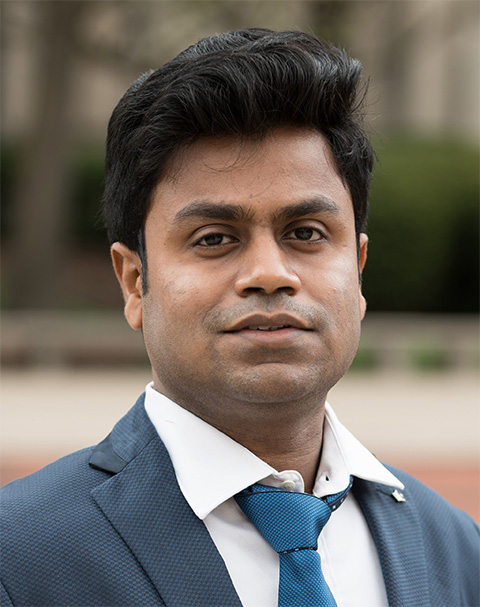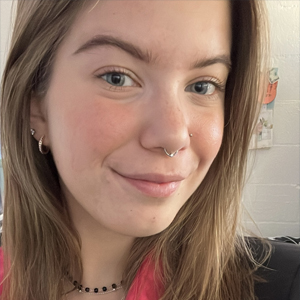
‘Keep on doing the steps’
The allure of scientific discovery has captivated Roshan Kumar since childhood, and he was eager “to study the science books” even in his early school days, he said. But he earned his undergraduate degree with very little experience in the lab — his university didn’t emphasize research, so his skills didn’t progress far beyond how to use a pipette.
“I only had critical knowledge at that time,” he said.

Kumar’s dream was to attend medical school and become a practicing physician. Because he couldn’t do extensive research as an undergraduate, he was unaware of career opportunities in the lab. When a medical school rejected his application, however, he entered a master’s program in an advanced academic setting that included more involved laboratory techniques. He began to realize the endless possibilities that a career in research held for him. He said he experienced personal growth and shifted his goal.
“It doubled my love for science,” he said. “From there onwards, I steered my whole vision toward research.”
During his doctoral studies at the University of Hyderabad in India, Kumar’s research focused on understanding the protein modifications that cause Parkinson’s disease. Some days were fruitless, producing little to no data, he said; other days were full of victory and progress. Throughout, he maintained a consistent mindset.
“There are phases, for sure, where things never work out for you,” he told himself. “But don’t lose hope. Believe in yourself. Keep on doing the steps.”
Kumar now is working toward completing his postdoctoral studies in Ruma Banerjee’s lab at the University of Michigan Medical School, where his goal is to characterize how metabolism regulates intestinal disease. He hopes to pursue a position in academia after he completes his postdoc and will begin his job search next year.
Friend or foe? Hydrogen sulfide’s dual role in metabolism
Hydrogen sulfide, or H2S, is a gas produced by three enzymes in mammalian cells as well as by the gut microbial metabolism. H2S is important for mitochondrial respiration and acts as a signaling molecule at low concentrations. At higher levels, however, H2S can inhibit complex IV in the electron transport chain of the mitochondria, killing the organelle that provides energy to cells.
Roshan Kumar, a postdoc at the University of Michigan, became particularly interested in this characteristic of H2S and its ability to modulate angiogenesis, neuronal processes and cardiovascular functions.
Inspired by his fascination with mitochondria and guided by his training in biochemical research, Kumar began to study the effects of H2S inhibition of respiratory complex IV in mitochondrial metabolism. He specifically was interested in environments with characteristically high levels of the gas due to microbial release, primarily the intestinal epithelia.
Kumar and his colleagues aimed to understand how saturation of electron transport chain complexes counteracts H2S toxicity in such locations. They recently found that H2S can induce glycolysis and inhibit oxidative phosphorylation. They also discovered that mammalian cells reprogram metabolism using sulfide quinone oxidoreductase, an enzyme required for H2S detoxification. This enzyme can establish a redox cycle by causing the reversal of succinate dehydrogenase, or respiratory complex II. This reversal regenerates coenzyme Q, a cofactor required for the clearance of H2S. In this process, fumarate, a citric acid cycle intermediate, acts as a terminal electron acceptor. This mechanism effectively oxidizes H2S and mitigates levels of toxicity.
This finding may help researchers understand certain gut-based conditions including colitis and colorectal cancer. Kumar is interested in pursuing this study by observing how H2S toxicity affects the body when it leaves the intestinal environment.
“A redox cycle with complex II prioritizes sulfide quinone oxidoreductase-dependent H2S oxidation” was published in the Journal of Biological Chemistry in January 2022. Kumar and other winners of the JBC Tabor Award will give talks during a symposium on Sunday, March 26, at Discover BMB in Seattle.
Enjoy reading ASBMB Today?
Become a member to receive the print edition four times a year and the digital edition monthly.
Learn moreGet the latest from ASBMB Today
Enter your email address, and we’ll send you a weekly email with recent articles, interviews and more.
Latest in People
People highlights or most popular articles

Kiessling wins glycobiology award
She was honored by the Society for Glycobiology for her work on protein–glycan interactions.

2026 ASBMB election results
Meet the new Council members and Nominating Committee member.

Simcox wins SACNAS mentorship award
She was recognized for her sustained excellence in mentorship and was honored at SACNAS’ 2025 National Conference.

From humble beginnings to unlocking lysosomal secrets
Monther Abu–Remaileh will receive the ASBMB’s 2026 Walter A. Shaw Young Investigator Award in Lipid Research at the ASBMB Annual Meeting, March 7-10 in Washington, D.C.

Chemistry meets biology to thwart parasites
Margaret Phillips will receive the Alice and C. C. Wang Award in Molecular Parasitology at the ASBMB Annual Meeting, March 7-10 in Washington, D.C.

ASBMB announces 2026 JBC/Tabor awardees
The seven awardees are first authors of outstanding papers published in 2025 in the Journal of Biological Chemistry.

